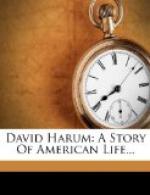“’Lish Harum,” she began, “wa’n’t only half-brother to Dave. He was hull-brother to me, though, but notwithstandin’ that, I will say that a meaner boy, a meaner growin’ man, an’ a meaner man never walked the earth. He wa’n’t satisfied to git the best piece an’ the biggist piece—he hated to hev any one else git anythin’ at all. I don’t believe he ever laughed in his life, except over some kind o’ suff’rin’—man or beast—an’ what’d tickle him the most was to be the means on’t. He took pertic’ler delight in abusin’ an’ tormentin’ Dave, an’ the poor little critter was jest as ‘fraid as death of him, an’ good reason. Father was awful hard, but he didn’t go out of his way; but ’Lish never let no chance slip. Wa’al, I ain’t goin’ to give you the hull fam’ly hist’ry, an’ I’ve got to go into the kitchen fer a while ’fore dinner, but what I started out fer ’s this: ’Lish fin’ly settled over to Whitcom.”
“Did he ever git married?” interrupted Mrs. Cullom.
“Oh, yes,” replied Mrs. Bixbee, “he got married when he was past forty. It’s curious,” she remarked, in passing, “but it don’t seem as if the’ was ever yit a man so mean but he c’d find some woman was fool enough to marry him, an’ she was a putty decent sort of a woman too, f’m all accounts, an’ good lookin’. Wa’al, she stood him six or seven year, an’ then she run off.”
“With another man?” queried the widow in an awed voice. Aunt Polly nodded assent with compressed lips.
“Yes’m,” she went on, “she left him an’ went out West somewhere, an’ that was the last of her; an’ when her two boys got old enough to look after themselves a little, they quit him too, an’ they wa’n’t no way growed up neither. Wa’al, the long an’ the short on’t was that ’Lish got goin’ down hill ev’ry way, health an’ all, till he hadn’t nothin’ left but his disposition, an’ fairly got onter the town. The’ wa’n’t nothin’ for it but to send him to the county house, onless somebody ’d s’port him. Wa’al, the committee knew Dave was his brother, an’ one on ’em come to see him to see if he’d come forwud an’ help out, an’ he seen Dave right here in this room, an’ Dave made me stay an’ hear the hull thing. Man’s name was Smith, I remember, a peaked little man with long chin whiskers that he kep’ clawin’ at with his fingers. Dave let him tell his story, an’ he didn’t say nothin’ fer a minute or two, an’ then he says, ‘What made ye come to me?’ he says. ‘Did he send ye?’
“‘Wa’al,’ says Smith, ‘when it was clear that he couldn’t do nuthin’, we ast him if the’ wa’n’t nobody could put up fer him, an’ he said you was his brother, an’ well off, an’ hadn’t ought to let him go t’ the poorhouse.’
“‘He said that, did he?’ says Dave.
“‘Amountin’ to that,’ says Smith.
“‘Wa’al,’ says Dave, ’it’s a good many years sence I see ‘Lish, an’ mebbe you know him better ‘n I do. You known him some time, eh?’
“‘Quite a number o’ years,’ says Smith.




